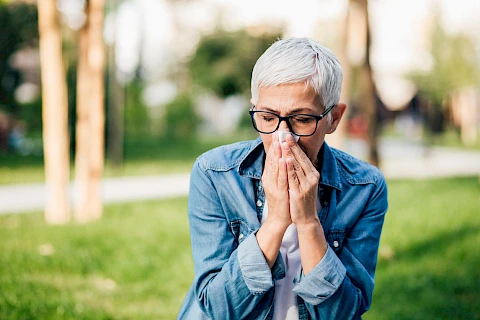
As autumn approaches, many seniors experience seasonal allergies triggered by pollen, mold, and other environmental factors. At the same time, the cooler weather can lead to an increase in colds and respiratory infections. Distinguishing between seasonal allergies and a cold can be challenging, but understanding the differences in symptoms and treatments is crucial for effective management. This article will help seniors recognize the key signs of each condition and provide guidance on potential treatments. When you're not sure what symptoms you or a loved one are experiencing, always consult a doctor.
All About Seasonal Allergies
Seasonal allergies are allergy-related symptoms that occur at certain times of the year. They are often triggered by types of pollen that are only present during that season.
Seasonal allergies often come with specific symptoms:
- Sneezing
- Runny or stuffy nose
- Itchy eyes, nose, or throat
- Watery eyes
Those symptoms do not include a fever and are usually less severe when exposure to the allergen is reduced or eliminated.
Triggers for Seasonal Allergies
Several triggers can cause seasonal allergies, including:
- Pollen
- Mold spores
- Dust
If you or a loved one are dealing with recurring symptoms, keep an eye out for what is most likely to trigger them.
Duration and Timing of Symptoms
Symptoms of seasonal allergies tend to follow a pattern. They often occur during specific seasons when pollen or mold spores are prevalent. Unlike colds, these symptoms can last for weeks or even months if the allergens are present.
The Basics of Colds
The common cold shares some symptoms with allergies but also has several unique ones.
- Sneezing
- Runny or stuffy nose
- Sore throat
- Cough
- Mild fever
- Fatigue
Colds are caused by viral infections. They are typically spread through droplets in the air from coughs or sneezes, as well as touching contaminated surfaces and then touching the face.
Duration and Timing of Symptoms
Colds are short-term illnesses. Symptoms usually appear suddenly and last for about a week. Most people recover within 7 to 10 days.
Key Differences Between Seasonal Allergies and Colds
One key difference between allergies and colds is the presence of a fever. Colds often come with a mild fever, whereas allergies do not. Itchy eyes are common with allergies but not with colds. Additionally, allergy symptoms can persist as long as the allergens are present, while cold symptoms are short-lived.
The Onset of Symptoms
The onset of symptoms for allergies is usually gradual, as exposure to allergens increases. In contrast, cold symptoms tend to appear suddenly after exposure to a virus.
Seasonal Occurrence
Seasonal allergies occur at specific times of the year, such as spring and autumn when pollen levels are high. Colds can happen at any time, but are more common in the winter months.
Treatment Options
Several ways can be used to manage seasonal allergies, including over-the-counter antihistamines, nasal sprays, and avoiding known triggers.
For colds, the main treatment involves rest and hydration. Over-the-counter cold medications can alleviate symptoms. Home remedies, such as honey in tea and steam inhalation, can also provide relief.
When to Seek Medical Advice
Understanding the differences between seasonal allergies and colds helps seniors manage their health effectively. By recognizing the symptoms and employing the appropriate treatments, seniors can navigate the challenges of autumn more comfortably.
However, if allergy symptoms are severe or if colds are frequent, it’s important to contact a healthcare provider. A doctor can recommend tailored solutions, evaluate any underlying conditions, and help seniors find the best management strategies for their individual needs.
More Care for Seniors This Fall and Winter
Taking proactive steps to address these health concerns can lead to a more enjoyable and healthier fall season.
Do you need more help at home during cold and flu season, including help with light cleaning that can help alleviate allergy symptoms? For those living in Fort Collins, Englewood, Littleton, Lone Tree, and Longmont, Senior Helpers Fort Collins is here to provide in-home support and care.Reach out to us for more information about our senior care services.